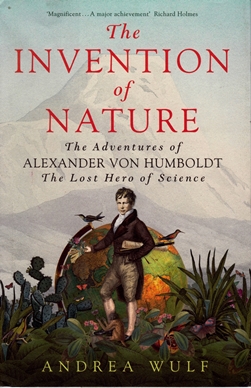 When Charles Darwin was hurriedly planning for his voyage aboard HMS Beagle in 1831, one major concern was – his library. Space was severely limited; only the best and most up-to-date books would do. As everyone knows, Charles Lyell's was foremost among them, subsequent volumes of his Principles even being sent poste restante to Darwin during the voyage. There was also Daubeny on volcanoes; and D’Aubuisson de Voisins’ Traité de Géogosie. Adam Sedgwick, Darwin’s Cambridge tutor, had plenty of advice for the young tyro, and in the middle of it he wrote (letter dated 18 September 1831): “Humboldt’s Personal Narrative you will of course get. He will at least show you the right spirit with wh. a man should set to work – …”
When Charles Darwin was hurriedly planning for his voyage aboard HMS Beagle in 1831, one major concern was – his library. Space was severely limited; only the best and most up-to-date books would do. As everyone knows, Charles Lyell's was foremost among them, subsequent volumes of his Principles even being sent poste restante to Darwin during the voyage. There was also Daubeny on volcanoes; and D’Aubuisson de Voisins’ Traité de Géogosie. Adam Sedgwick, Darwin’s Cambridge tutor, had plenty of advice for the young tyro, and in the middle of it he wrote (letter dated 18 September 1831): “Humboldt’s Personal Narrative you will of course get. He will at least show you the right spirit with wh. a man should set to work – …”
Alexander von Humboldt (1769-1859) is indeed the ‘lost hero’ described in the title of this brilliant survey of his astonishing travels, work, influence (and influences). It is curious that the reputation of someone, described in his lifetime as ‘the most famous man in the world after Napoleon’, has been so eclipsed. Perhaps he influenced too many, too profoundly. Perhaps they owed him so much it was embarrassing. Perhaps he was too modern, now too much ‘part of the furniture’. Perhaps he was too independent. It is high time the English-speaking world remembered this Prussian aristocrat-scientist.
Although it may be too much to suggest that the vulcanist Humboldt foreshadowed plate tectonics, his achievements render such stretches unnecessary. In seeing the living and non-living world as a single entity, he invented the ecological approach and foreshadowed the Gaia hypothesis. He understood how human economics interfered (detrimentally) with natural systems; how agriculture and irrigation affected hydrosphere and biosphere; how colonial power led to ecological depredation and economic disaster. A fervent anti-imperialist, anti-slavery libertarian, he even foresaw the effects of industrial emissions on the composition and behaviour of the atmosphere. In viewing Earth as a functioning whole, Humboldt really did ‘invent’ nature. His range of influences, from Goethe and Simon Bolívar to Darwin, Haeckel, Muir, Emerson and Thoreau, defies belief.
Humboldt entertained many intense intellectual friendships, but, as they say, ‘never married’. The prurient reader will chafe at Wulf’s refusal to go further into this matter: but she is too much a historian to ask anachronistic questions. Hard as it may be for us to conceive, I suspect that Humboldt’s mind really was on higher things. Chimborazo, Cotopaxi had him in their spell.
Reviewed by Ted Nield
THE INVENTION OF NATURE: THE ADVENTURES OF ALEXANDER VON HUMBOLDT, THE LOST HERO OF SCIENCE, by Andrea Wulf. John Murray, 2015. List Price: £25.00 473pp hbk